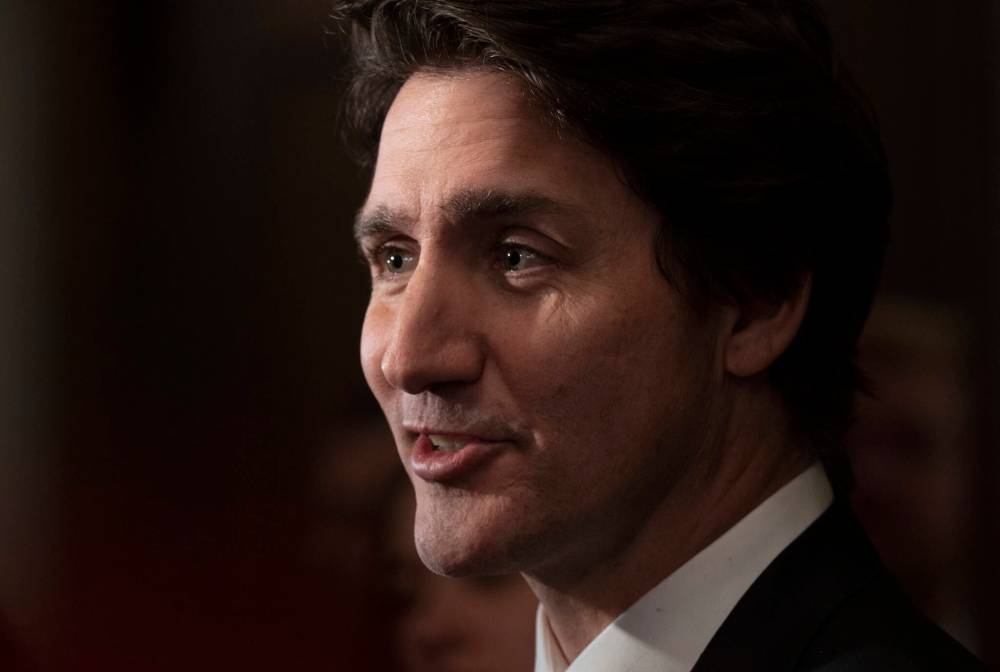Trudeau to meet with Kinew, sign $1.2-B health-care deals today
More than $400M earmarked to recruit, train, retain front-line medical workers over next three years
Advertisement
Read this article for free:
or
Already have an account? Log in here »
To continue reading, please subscribe:
Monthly Digital Subscription
$0 for the first 4 weeks*
- Enjoy unlimited reading on winnipegfreepress.com
- Read the E-Edition, our digital replica newspaper
- Access News Break, our award-winning app
- Play interactive puzzles
*No charge for 4 weeks then price increases to the regular rate of $19.00 plus GST every four weeks. Offer available to new and qualified returning subscribers only. Cancel any time.
Monthly Digital Subscription
$4.75/week*
- Enjoy unlimited reading on winnipegfreepress.com
- Read the E-Edition, our digital replica newspaper
- Access News Break, our award-winning app
- Play interactive puzzles
*Billed as $19 plus GST every four weeks. Cancel any time.
To continue reading, please subscribe:
Add Free Press access to your Brandon Sun subscription for only an additional
$1 for the first 4 weeks*
*Your next subscription payment will increase by $1.00 and you will be charged $16.99 plus GST for four weeks. After four weeks, your payment will increase to $23.99 plus GST every four weeks.
Read unlimited articles for free today:
or
Already have an account? Log in here »
Hey there, time traveller!
This article was published 15/02/2024 (657 days ago), so information in it may no longer be current.
Prime Minister Justin Trudeau and Premier Wab Kinew will meet in Winnipeg today to sign two new health-care deals expected to dedicate more than $400 million to add more doctors, nurses and staff to the front lines of Manitoba’s overloaded health system.
Manitoba will become the sixth province to sign on to the federal government’s Working Together bilateral funding agreement, which will see a total $1.22 billion flow to the province over 10 years.
Under the deal, Manitoba will receive nearly $434 million to fulfil a three-year action plan agreed to by the provincial and federal governments, according to an official with knowledge of the agreement.

Adrian Wyld / The Canadian Press files
Prime Minister Justin Trudeau.
Sources confirmed Manitoba will devote most of that money to bolster its workforce of physicians, nurses, paramedics and other health-care providers through recruitment, training and retention programs.
During last fall’s election, the NDP promised to add 1,000 new health-care professionals and support staff, including 400 doctors.
The bilateral agreement is part of a larger health-care funding accord announced in February 2023 to increase the federal contribution to the Canada Health Transfer by $46 billion over the next decade.
Signed in principle by most provinces one year ago, Quebec remains the only holdout. The agreement-in-principle with Manitoba calls for Ottawa to transfer a total of $6.74 billion to the province over 10 years.
Manitoba was required to sign the bilateral agreement by the end of March if it wanted to receive funding for the current fiscal year. A one-time, $72-million top up to the CHT to address urgent needs was also part of the deal.
The nearly $434 million in new funding will allow Manitoba to add more doctors, recruit health workers to northern and rural communities and reduce emergency room waits and backlogs, according to the government official.
It will also be dedicated to staffing more hospital beds, supporting addictions treatment services and community mental health initiatives and doubling hospital spaces for people experiencing homelessness and needing support.
The plan also calls for additional nurses, psychologists, physiotherapists, occupational therapists, social workers and health-care aides to be hired to cut down on wait times for care.
Manitoba Health Minister Uzoma Asagwara declined to comment on the deal ahead of the official announcement.
Dr. Michael Boroditsky, president of Doctors Manitoba, said tackling the shortage of physicians and health-care providers should, rightly, be the focus of any new funding agreements.
“That is the cause of almost every challenge patients face in health care,” Boroditsky said. “Whether it’s trouble finding a family physician, difficulty seeing a specialist or getting a procedure, or facing long wait times or closures in ERs, the common cause is the significant shortage of physicians, nurses and other health-care providers.”
The plan will also remove barriers to foreign credential recognition, simplify licensing processes and improve mobility of health-care workers within Canada, according to the government official. Increasing access to electronic health information is also a feature of the deal.
Specifics of Manitoba’s three-year action plan were not immediately available.
The province will also sign on to the federal government’s Aging with Dignity agreement, which will see Ottawa provide approximately $199 million over five years to expand home, community and long-term care for seniors and reduce waits for dementia programming.
Home-modification and hearing aid programs will also be funded through the agreement. Money is also earmarked to address gaps in Indigenous health-care services and to support culturally safe, community-led health programming for youth and families.
The Manitoba Nurses Union hasn’t been involved in discussions about the bilateral deal, but president Darlene Jackson said she’s looking forward to speaking with the province about how the money can be spent.
“This is going to be a great injection of funding into our health-care system, and I will tell you that for me, retention of nurses in the system is extremely important, and I think that utilization of some of these funds to do that is going to be key to keep everyone in the system.”
Recruitment is important, and so is working on bringing nurses back to the public system if they’ve left to work for private agencies, Jackson said.
There are strings attached to some of the federal dollars.
Ottawa is requiring provinces to create family health teams that include physicians, nurse practitioners, nurses, pharmacists and social workers. Provinces must also spend on digital tools to improve medical records, better access to mental-health and addictions services and a targeted plan to reduce surgical and diagnostic wait times.
Provinces must demonstrate clear proof of progress in each of the specified priorities to trigger the remainder of the funding.
The accord is a significant increase in total health-care funding from Ottawa, which now will top out just shy of $200 billion over the next decade. However, it falls well short of the $300 billion the provinces had demanded in negotiations with the Trudeau government.
Although the additional money is desperately needed by the provinces, the fanfare surrounding the formal announcements has political value for Trudeau and his beleaguered government.
Trailing badly in the polls to the federal Conservative party, the signing ceremonies present an important opportunity for the prime minister to participate in a good-news announcement alongside premiers who have, in the past, been very critical of the federal government.
— with files from Katie May
dan.lett@winnipegfreepress.com
danielle.dasilva@freepress.mb.ca

Dan Lett is a columnist for the Free Press, providing opinion and commentary on politics in Winnipeg and beyond. Born and raised in Toronto, Dan joined the Free Press in 1986. Read more about Dan.
Dan’s columns are built on facts and reactions, but offer his personal views through arguments and analysis. The Free Press’ editing team reviews Dan’s columns before they are posted online or published in print — part of the our tradition, since 1872, of producing reliable independent journalism. Read more about Free Press’s history and mandate, and learn how our newsroom operates.
Our newsroom depends on a growing audience of readers to power our journalism. If you are not a paid reader, please consider becoming a subscriber.
Our newsroom depends on its audience of readers to power our journalism. Thank you for your support.










